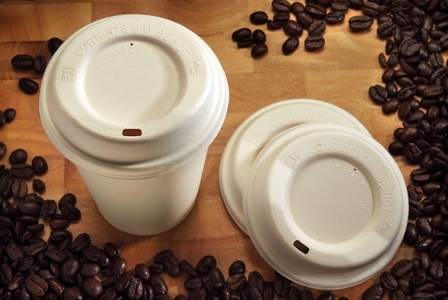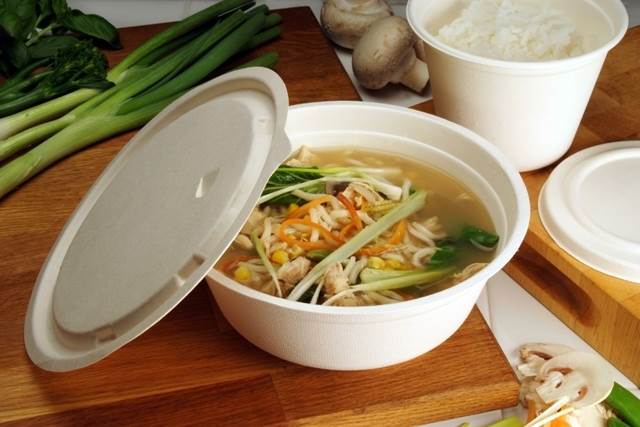- Contact 0870 350 7767
- |
- Advertise
Home > Sovereign Partners Ltd > Biodegradable vs. compostable packaging
Biodegradable vs. compostable packaging
 News and PR from Sovereign Partners Ltd - Published 12 April 2013
We explain the differences between materials used for eco-friendly foodservice packaging
News and PR from Sovereign Partners Ltd - Published 12 April 2013
We explain the differences between materials used for eco-friendly foodservice packaging
Look through any trade magazine or newspaper at the moment and the chances are that you will find at least one feature about compostable disposables and foodservice packaging. Here at Cap-It-All we think thats great news. After all, compostable products offer a far more environmentally friendly alternative to disposables and foodservice packaging made from more traditional materials. Cap-It-All is very proud to say that its GoodLife range of eco packaging is 100% compostable.
But, while compostable products are a more environmentally friendly alternative option to traditional products, they are not the most environmentally friendly option. That accolade goes to biodegradable disposables. Cap-It-All is even prouder to say that not only are GoodLife bagasse disposables totally compostable but they are also 100% biodegradable.
So, whats the difference?
Biodegradable
Materials can be described as biodegradable if they are capable of being decomposed by bacteria or other living organisms and break down into mostly water, carbon dioxide and organic matter.
What is remarkable about biodegradable products is that they can be disposed of in nothing more sophisticated than a domestic compost heap.
They can also be disposed of in an in-vessel composting (IVC) unit, along with general food waste, if necessary.
Compostable -
To be compostable, products must demonstrate that they break down and disintegrate in a compost system during the composting process (typically around 12 weeks at temperatures over 50oC).
According to Wrap Compostable plastics must be certified to standard EN 13432 or EN 14995, which pertain to conditions found in an industrial composting facility.
Compostable products must be disposed of in an in-vessel composting (IVC) unit. They cannot be disposed of on a domestic compost heap.
Cap-It-All is concerned that the terms biodegradable and compostable seem to have become almost interchangeable. Yet they are not the same thing. It is Cap-It-Alls belief that suppliers of compostable disposables have succeeded in shifting focus away from biodegradable packaging in order to promote their own products. We understand - their PR department has a job to do just as ours does. However it is not what some suppliers are saying that concerns us. It is what they are not saying. Yes, compostable disposables are more environmentally friendly than traditional disposables. But the fact is they are not as environmentally friendly as biodegradable disposables. Cap-It-All passionately believes that caterers and foodservice operators need to be made aware of the differences between the two if they are to make informed decisions about the right kind of products to use in their outlets.
What caterers might know
Sending waste to landfill is not environmentally friendly and it is expensive. The standard rate of landfill tax increased to £72 per tonne in the 2013 budget and will increase to £80 in the 2014 budget. It is not known what will happen after that. However Chancellor George Osborne has put a floor under the standard rate, meaning that the rate will not fall below £80 per tonne from 2014-15 to 2019-20.
Recycling disposables with food waste is more cost effective. In 2012, the median cost of recycling a tonne of food waste at an IVC facility in the UK was £49 (Gate Fees Report 2012, WRAP).
What they should know
There is a third option. By opting to use biodegradable disposables and food packaging instead of compostable alternatives businesses can reduce the amount of waste they need to send for disposal, which over time could add up to significant savings.
And it will not just be businesses that benefit. The environment will, too. Sending less waste for disposal will result in fewer trucks on the road, which means fewer harmful emissions into the atmosphere.
Isnt it all a matter of choice?
Not for businesses based in Scotland. From 1 January 2014, businesses which consistently produce 50kg or more food waste per week will be required to have a separate recycling stream for food waste. From January 2016, food businesses that produce more than 5kg of food waste per week will be required to have separate recycling stream for food waste.
But, while compostable products are a more environmentally friendly alternative option to traditional products, they are not the most environmentally friendly option. That accolade goes to biodegradable disposables. Cap-It-All is even prouder to say that not only are GoodLife bagasse disposables totally compostable but they are also 100% biodegradable.
So, whats the difference?
Biodegradable
Materials can be described as biodegradable if they are capable of being decomposed by bacteria or other living organisms and break down into mostly water, carbon dioxide and organic matter.
What is remarkable about biodegradable products is that they can be disposed of in nothing more sophisticated than a domestic compost heap.
They can also be disposed of in an in-vessel composting (IVC) unit, along with general food waste, if necessary.
Compostable -
To be compostable, products must demonstrate that they break down and disintegrate in a compost system during the composting process (typically around 12 weeks at temperatures over 50oC).
According to Wrap Compostable plastics must be certified to standard EN 13432 or EN 14995, which pertain to conditions found in an industrial composting facility.
Compostable products must be disposed of in an in-vessel composting (IVC) unit. They cannot be disposed of on a domestic compost heap.
Cap-It-All is concerned that the terms biodegradable and compostable seem to have become almost interchangeable. Yet they are not the same thing. It is Cap-It-Alls belief that suppliers of compostable disposables have succeeded in shifting focus away from biodegradable packaging in order to promote their own products. We understand - their PR department has a job to do just as ours does. However it is not what some suppliers are saying that concerns us. It is what they are not saying. Yes, compostable disposables are more environmentally friendly than traditional disposables. But the fact is they are not as environmentally friendly as biodegradable disposables. Cap-It-All passionately believes that caterers and foodservice operators need to be made aware of the differences between the two if they are to make informed decisions about the right kind of products to use in their outlets.
What caterers might know
Sending waste to landfill is not environmentally friendly and it is expensive. The standard rate of landfill tax increased to £72 per tonne in the 2013 budget and will increase to £80 in the 2014 budget. It is not known what will happen after that. However Chancellor George Osborne has put a floor under the standard rate, meaning that the rate will not fall below £80 per tonne from 2014-15 to 2019-20.
Recycling disposables with food waste is more cost effective. In 2012, the median cost of recycling a tonne of food waste at an IVC facility in the UK was £49 (Gate Fees Report 2012, WRAP).
What they should know
There is a third option. By opting to use biodegradable disposables and food packaging instead of compostable alternatives businesses can reduce the amount of waste they need to send for disposal, which over time could add up to significant savings.
And it will not just be businesses that benefit. The environment will, too. Sending less waste for disposal will result in fewer trucks on the road, which means fewer harmful emissions into the atmosphere.
Isnt it all a matter of choice?
Not for businesses based in Scotland. From 1 January 2014, businesses which consistently produce 50kg or more food waste per week will be required to have a separate recycling stream for food waste. From January 2016, food businesses that produce more than 5kg of food waste per week will be required to have separate recycling stream for food waste.
Other announcements from Sovereign Partners Ltd
-
The Ultimate Bio Sip-Lid from Cap-it-all
The new GoodLife Bio Sip-Lid fits all 12oz and 16oz paper hot cups
12 Apr 2013
-
New Takeaway Ramen Bowl and Lid from Cap-it-all
New to the GoodLife range of biodegradable foodservice packaging is the 32oz Ramen Bowl featuring a vented leak-proof bio-lid
12 Apr 2013





